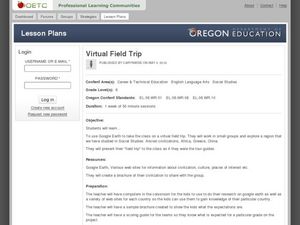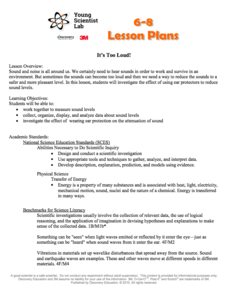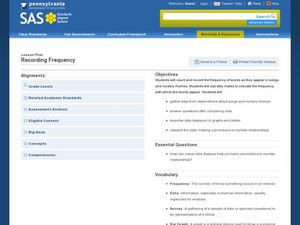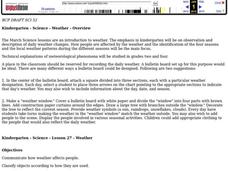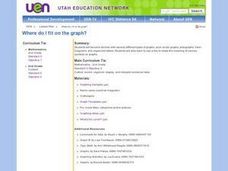Curated OER
An Introduction to Jan Brett
Students explore the concept of Jan Brett. In this author study lesson, students are introduced to several Jan Brett books with visuals, listening centers, and video. Students browse the internet in search of information about Jan Brett.
Curated OER
Multiply Boxplots
Students identify the mean, quartiles and range of a boxplot. In this statistics lesson, students identify cooperative boxplot as it relates to the data. They make conjectures about students grade distribution.
Alabama Learning Exchange
Jelly Beans Add Up
Students explore counting, sorting, and graphing skills. In this data analysis lesson, students sort jelly beans by color, count the jelly beans, and create a bar graph of the jelly beans according to color.
Alabama Learning Exchange
Inch by Inch
Third graders listen to a read-aloud of Leo Lionni's, Inch by Inch before measuring a variety of items using both standard and metric units. They record the measurement data and follow a recipe for dirt pie.
Curated OER
Pika Chew
Students work in collaborative teams with specific roles, use the Internet to research the behavior and ecology of pikas, make predictions about survival rates of pikas in different habitats and organize their data in graphs.
Curated OER
If It's to Be, It's Up to Me!
Eighth graders discuss the question: How does one become an effective decision-maker or problem solver in social situations? They are given three brief scenarios and after each one students are asked, "What would you do?" Students think...
Curated OER
We Can't Decide
Second graders investigate decision making skills that they can apply on a daily basis. In this decision making lesson, 2nd graders listen to a read aloud of Pinocchio and make a list of times when decisions have to be made. They access...
Curated OER
Publishing a Book Review
Pairs use desktop publishing software, as well as digital video and camera equipment, to craft a book review. These reviews are then shared with others in the school community through the class or school website.
Curated OER
Virtual Field Trip
This hands-on resource has future trip planners analyze graphs of mileage, gasoline costs, and travel time on different routes. While this was originally designed for a problem-solving exercise using a Michigan map, it could be used as a...
Discovery Education
It's Too Loud!
STEM scholars investigate sound attenuation by conducting an experiment in which they compare the farthest distance that they can hear a sound with and without ear protection.
Curated OER
Bird Feeding and Migration Observation
Students research bird migration and build a bird house. In this bird lesson plan, students research the birds in their area and where they migrate to. They also build their own bird house and record data on what kinds of birds come to...
Curated OER
Means of Growth
Students collect and graph data. For this statistics lesson, students analyze their plotted data using a scatter plot. They identify lines as having positive, negative or no correlation.
Curated OER
Making Money and Spreading the Flu!
Paper folding, flu spreading in a school, bacteria growth, and continuously compounded interest all provide excellent models to study exponential functions. This is a comprehensive resource that looks at many different aspects of these...
Curated OER
Shedding Light on the Weather with Relative Humidity
Learners study weather using a graphing calculator in this lesson plan. They collect data for temperature and relative humidity for every hour over a day from the newspaper, then place the data in their handheld calculator and examine it...
Curated OER
Recording Frequency
First graders analyze nursery rhymes and gather data about word frequency. In this frequency lesson, 1st graders create graphs and tables. Students interpret the data.
Curated OER
Corn-Crop is a Bin-Buster
Learners calculate percent change and create lists of data. They enter the corresponding bushels of corn measured in billions to their list and display, then convert the acres into scientific notation and use the value on the home screen...
Curated OER
Weather
Students communicate how weather affects people, classify objects according to how they are used, and observe and record weather data using symbols.
Curated OER
Conceptualizing an Experiment
Students work together to design an experiment. They discover the origin of a family artifact. They analyze the data and discuss the results. They determine if the experiment is the best way to find out this type of information.
Curated OER
Survey and Tally
Second graders view a model of a survey and tally. In this survey and tally lesson plan, 2nd graders decide on questions for a survey. Students conduct the survey and tally their results. Students create a tally chart. Students view a...
Curated OER
Where Do I Fit on the Graph?
Students collect data and create graphs about themselves, their community, and the world around them. They use a variety of methods to organize data, such as stickers, clothespins, name tags, coloring, tally marks, etc.
Curated OER
College Costs are on the Rise
Young scholars examine college costs in different states. In this college cost lesson, students create a table and determine the average cost of college for the states listed. They organize the data into measurement categories. Young...
Curated OER
Watershed Lesson Plan
Students are introduced to the concepts of a watershed, stream flow and water quality. This five-day plan is an excellent way to introduce students to the concepts involved. They create their own watershed using a paper bag, water and...
Curated OER
Analyzing Intertidal and Deep Sea Vent Communities
Students study how scientists measure diversity. In this diversity instructional activity students look at marine communities and look at data to calculate diversity in 3 different ways.
Curated OER
Water Conservation
Young scholars identify ways to conserve water. For this environmental lesson, students use a water use checklist to identify how much water they use in one day. Young scholars analyze the data and brainstorm ways to conserve water.










